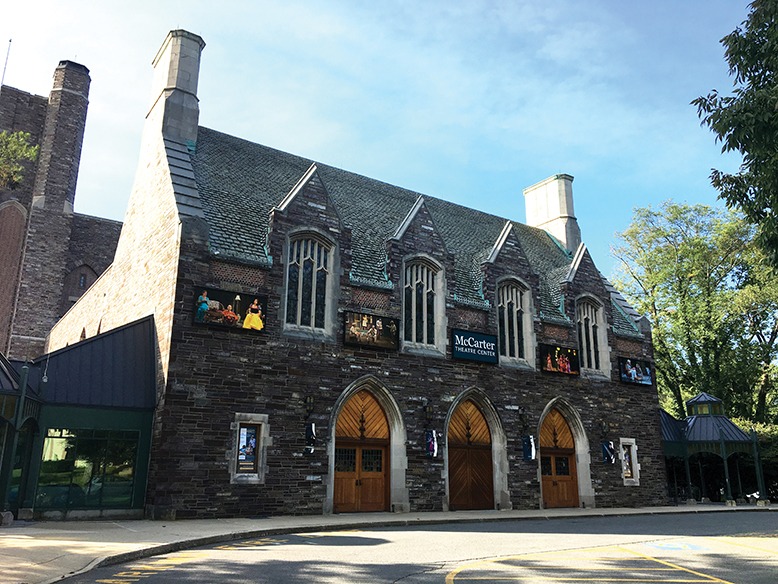
Sarah Rasmussen took over as artistic director at the McCarter Theatre Center amid the pandemic last August. Photo by William Clark
Growing up in the small town of Sisseton, South Dakota, a community with fewer than 2,500 residents, Sarah Rasmussen yearned for the live-theater opportunities a bustling metropolis would offer.
“I could sometimes be a grumpy teenager,” she says. “[I’d think,] Ugh, I’m so far away from any big cities where any real art happens.”
When the Montana-based Missoula Children’s Theatre came to town, Rasmussen participated in a weeklong program with professional theater artists.
The experience was a revelation. She immediately understood that, even without the resources of other communities, theater is something “one can figure out how to do on their own,” she says.
In middle school, Rasmussen started writing and directing plays with her two best friends. (“They were probably a little hard to follow, but had excellent costumes.”) By high school, her role as a director became more formal. She requested the rights to a series of plays, cast dozens of kids in the productions, and attracted hundreds of community members to the shows. Rasmussen had created her own theater company.
“I saw the need in the community and started initiating the work,” says Rasmussen. “I could see that it brought a lot of meaning and joy to people. What’s really stayed with me is that idea that arts should feel like they’re a gift for both the people involved as artists and the audience.”
One year ago, Rasmussen brought that vision to the McCarter Theatre Center in Princeton, where she took over as artistic director following the departure of longtime director and playwright Emily Mann.
It was a remarkable opportunity for someone whose horizons once seemed limited. “I felt this is a really interesting confluence of both the professional theater and the connection to the academic community,” says Rasmussen. “It’s really neat to think of arts and live performance as being a container to have conversations about absolutely everything else in the world.”

McCarter will reopen in September for in-person audiences. Wikimedia Commons/Tpmiller120
Indeed, Rasmussen’s career has taken her far from South Dakota. Over the years, she has served as head of the MFA program in directing at the University of Texas; the resident director at Oregon Shakespeare Festival’s Black Swan Lab; and most recently, the artistic director of the Jungle Theater in Minneapolis.
In the latter post, Rasmussen took over for the founder, who led the Jungle Theater for 25 years—an experience much like succeeding Mann, whose name has become synonymous with McCarter over the course of her 30-year tenure.
During her time in Minneapolis, Rasmussen was an inaugural recipient of the Bold Leadership Circle grant, which supports the development of female artistic leaders. Now, the grant supports McCarter’s new associate artistic director, Nicole A. Watson, who joined the theater shortly after Rasmussen.
Rasmussen arrived at McCarter amid the pandemic last August, when live shows were on hold.
Luckily, much of her interview process with McCarter happened in-person before the health crisis. “I got to see what everything felt like when it was up and running,” she says. (Rasmussen, 42, now lives in Princeton with her playwright husband, Josh Tobiessen, and their children, Isak and Nora.)
[RELATED: Meet the Visionary Revitalizing Newark Symphony Hall]
Once on the job, Rasmussen met her new staff via Zoom. To immerse herself in the Princeton community, she began holding Fireside Chats, a socially distant conversation series beside a cozy outdoor firepit on the Princeton University campus. Guests included the Reverend Dr. Theresa Thames, a dean at Princeton University; Kathy Klockenbrink, co-owner of local restaurant and café Jammin’ Crêpes; and Lew Gantwerk, an actor and longtime student of McCarter’s education programs.
During the pandemic, the theater center launched McCarter @ Home, an online platform featuring various digital projects—most notably, the Adrienne Kennedy play festival and the Manic Monologues theatrical experience—as well as educational classes. Moving forward, Rasmussen plans to continue some virtual programming.
“People all over the country really were engaging with the digital content, especially teachers, who don’t always have resources to share what theater is,” says Rasmussen.
One example of ongoing online content is Bard at the Gate, a series of digital play readings created by Pulitzer Prize-winning playwright Paula Vogel. The series, which will continue through 2023, showcases overlooked plays by people of color, women, members of the LGBTQ community, and artists with disabilities.
***
McCarter plans to reopen to in-person audiences in mid-September. The center’s 2021–2022 season promises work that is “substantive, intelligent, but also really fun,” says Rasmussen. “We’re really rebuilding a theater out of this time. I think it’s going to be a powerful time for the arts to find ways to contribute to healing and laughter and joy and purpose and meaning in people’s lives as we come back together.”
Some of the upcoming artists will be audience favorites; others will be new to McCarter. Patrons can look forward to the indie band Lake Street Dive, hip-hop artist Dessa, Broadway’s Kelli O’Hara and singer/songwriter Richard Thompson.
[RELATED: Musician Richard Thompson Recounts Early Years in New Memoir]
The new season will feature two musicals. The first, Dreaming Zenzile, written by Grammy-nominated artist Somi Kakoma, is based on the life of South African singer, songwriter and anti-apartheid activist Miriam Makeba. Later in the season, Rasmussen will make her McCarter directorial debut with Ride the Cyclone by Brooke Maxwell and Jacob Richmond. The musical follows six teenagers stuck in limbo after they are killed on a faulty roller coaster.
“It looks at grief, but through the lens of a lot of poignancy and humor,” says Rasmussen. “For me, it strikes the right chord of honoring how much loss and grief have been a part of our lives [throughout the pandemic], but also, I hope we’ll leave audiences remembering what’s good right now—what they’re grateful for.”
Michael S. Rosenberg, McCarter’s managing director, is grateful for a leader like Rasmussen. He describes her as “a generous listener and a consensus builder.” Indeed, since her days in Sisseton, Rasmussen has strived to bring out the best in others.
“That’s what I love about directing,” she says. “It’s a way to gather other talented artists and then say, ‘What is unique about you? How do I really bring that out and help you share that with others?’”
Rosenberg is also pleased with Rasmussen’s commitment to carrying on Emily Mann’s legacy.
Says Rasmussen: “The best way to honor the amazing work that Emily did is to just do the work that I feel like American theater needs in this moment. We’re only here because people took great care with an institution like this in past decades, and it’s really an honor to get to lead it into a new chapter.”
